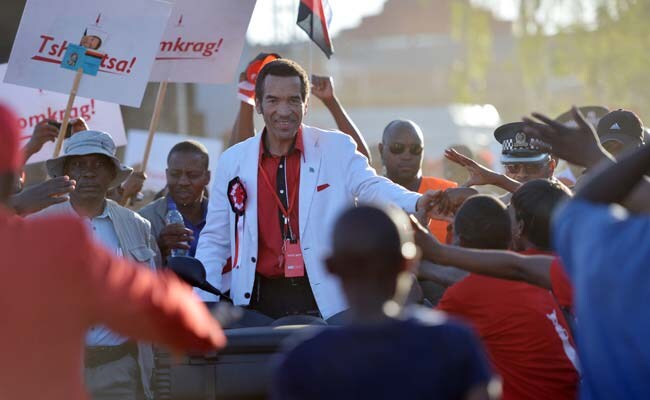
Botswana President Seretse Ian Khama during election rally in Gaborone. (Agence France-Presse)
Gaborone, Botswana:
Botswana President Ian Khama has won a second term in power after his party secured a parliamentary majority at the polls, an official announced on Sunday.
High Court Chief Justice Maruping Dibotelo said in a statement that Mr Khama "has been re-elected as the President of the Republic after his political party, the Botswana Democratic Party (BDP) garnered at least 29 of the 57 parliamentary seats" at Friday's general election.
Mr Khama will be inaugurated on Monday, said Justice Dibotelo in a statement broadcast on national radio and television.
The newly formed Umbrella for Democratic Change (UDC), led by Duma Boko, which was contesting elections for the first time becomes the official opposition with 12 seats in parliament.
Mr Khama, 61, is the son of the country's first president, Seretse Khama. He is also a traditional chief of the Bangwato clan and benefited from his strong rural support.
But he faced a challenge in urban areas, where opposition parties have made inroads since the formation in 2010 of a breakaway party, the Botswana Movement for Democracy (BMD), which is now part of the UDC coalition.
No celebrations took place in the streets of Gaborone after the announcement of the results in the early hours of Sunday morning.
Full results are yet to be published and scores of people, particularly UDC supporters, were still eagerly gathered at counting stations.
The UDC has accused Mr Khama of becoming increasingly authoritarian. The umbrella grouping won seats in several former BDP strongholds, including the capital Gaborone.
"The UDC did well for a new party, but naturally we were hoping for more votes to topple the BDP. It was never to be," said Seakamela Motsoaledi, a UDC party representative.
Botswana was has been governed by the BDP since independence from Britain, had cautioned that this year's election would be the most challenging for the party.
Mr Khama's is faced with the task of diversifying the economy of the diamond-rich southern African nation and improving the lives of the 2 million population.
With the global financial crisis leading to a drop in diamond revenues, Mr Khama's government had halted planned investment, leading to growing unemployment, in a country known as one of Africa's most stable democracies.
He had ran an election campaign based on the country's past economic successes, pointing at the progress made in health care provision and good governance.
Former opposition Botswana Congress Party took two seats. Electoral authorities said tallying of local council ballots was still ongoing, in an election where some 800,000 people were registered to vote.
High Court Chief Justice Maruping Dibotelo said in a statement that Mr Khama "has been re-elected as the President of the Republic after his political party, the Botswana Democratic Party (BDP) garnered at least 29 of the 57 parliamentary seats" at Friday's general election.
Mr Khama will be inaugurated on Monday, said Justice Dibotelo in a statement broadcast on national radio and television.
The newly formed Umbrella for Democratic Change (UDC), led by Duma Boko, which was contesting elections for the first time becomes the official opposition with 12 seats in parliament.
Mr Khama, 61, is the son of the country's first president, Seretse Khama. He is also a traditional chief of the Bangwato clan and benefited from his strong rural support.
But he faced a challenge in urban areas, where opposition parties have made inroads since the formation in 2010 of a breakaway party, the Botswana Movement for Democracy (BMD), which is now part of the UDC coalition.
No celebrations took place in the streets of Gaborone after the announcement of the results in the early hours of Sunday morning.
Full results are yet to be published and scores of people, particularly UDC supporters, were still eagerly gathered at counting stations.
The UDC has accused Mr Khama of becoming increasingly authoritarian. The umbrella grouping won seats in several former BDP strongholds, including the capital Gaborone.
"The UDC did well for a new party, but naturally we were hoping for more votes to topple the BDP. It was never to be," said Seakamela Motsoaledi, a UDC party representative.
Botswana was has been governed by the BDP since independence from Britain, had cautioned that this year's election would be the most challenging for the party.
Mr Khama's is faced with the task of diversifying the economy of the diamond-rich southern African nation and improving the lives of the 2 million population.
With the global financial crisis leading to a drop in diamond revenues, Mr Khama's government had halted planned investment, leading to growing unemployment, in a country known as one of Africa's most stable democracies.
He had ran an election campaign based on the country's past economic successes, pointing at the progress made in health care provision and good governance.
Former opposition Botswana Congress Party took two seats. Electoral authorities said tallying of local council ballots was still ongoing, in an election where some 800,000 people were registered to vote.
Track Latest News Live on NDTV.com and get news updates from India and around the world

